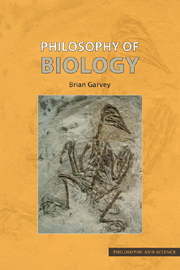Book contents
- Frontmatter
- Contents
- Acknowledgements
- Introduction
- 1 The argument in Darwin's Origin
- 2 The power of genes
- 3 Units of selection
- 4 Panglossianism and its discontents
- 5 The role of development
- 6 Nature and nurture
- 7 Function: “what it is for” versus “what it does”
- 8 Biological categories
- 9 Species and their special problems
- 10 Biology and philosophy of science
- 11 Evolution and epistemology
- 12 Evolution and religion
- 13 Evolution and human nature
- 14 Biology and ethics
- Notes
- Further reading
- Bibliography
- Index
12 - Evolution and religion
- Frontmatter
- Contents
- Acknowledgements
- Introduction
- 1 The argument in Darwin's Origin
- 2 The power of genes
- 3 Units of selection
- 4 Panglossianism and its discontents
- 5 The role of development
- 6 Nature and nurture
- 7 Function: “what it is for” versus “what it does”
- 8 Biological categories
- 9 Species and their special problems
- 10 Biology and philosophy of science
- 11 Evolution and epistemology
- 12 Evolution and religion
- 13 Evolution and human nature
- 14 Biology and ethics
- Notes
- Further reading
- Bibliography
- Index
Summary
The theory of evolution is often seen as a rival to the theory that the world was created by God. Popular media sources, including numerous websites, often either point out alleged flaws in the theory of evolution with a view to promoting belief in God, or attack a view called “creationism” in the name of good science, and in particular evolution. In these latter attacks it is not always clear exactly what creationism is, but in the crudest versions the word often means a literal belief in the account of creation in Genesis. But it is clear that many religious believers, including many members of mainstream Christian churches, neither believe the Genesis account literally, nor are required by their churches to do so. The Roman Catholic Church, for example, has always taken the view that the Bible should not be read literally.
There are, of course, more sophisticated versions of the anti-creationist argument that do not focus on an account as specific as that of Genesis, but instead on the broader claim that the world was created by a God as standardly conceived by the monotheistic religions: a being that is omnipotent, omniscient, omnibenevolent and so on. The purposefulness of many features of organisms (the eye being “well designed” for seeing and so on) has frequently been taken to be especially compelling evidence for this God.
- Type
- Chapter
- Information
- Philosophy of Biology , pp. 189 - 206Publisher: Acumen PublishingPrint publication year: 2007

